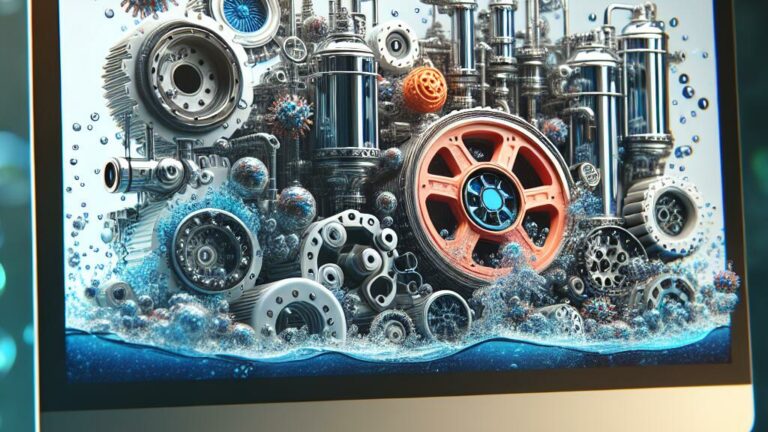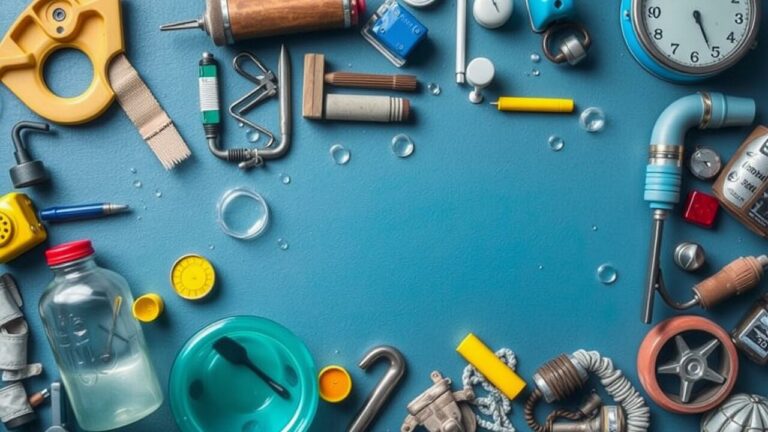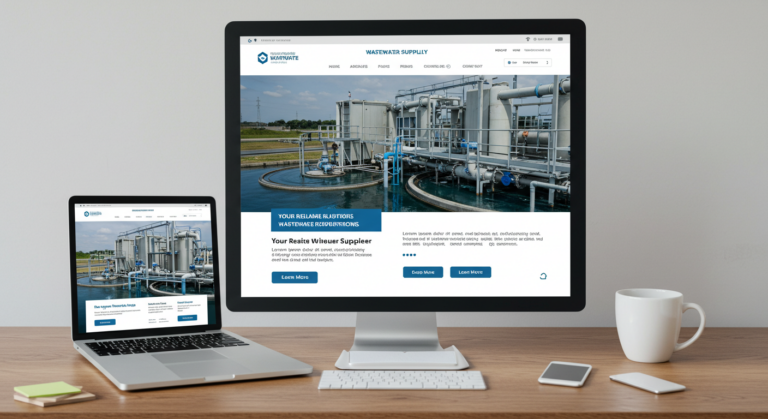Effective waste water management is crucial for sustainable development and environmental protection. The Top Waste Water Products: Efficient Solutions for Treatment & Recycling play a vital role in optimizing waste water treatment processes, leading to improved waste disposal practices and enhanced water recycling initiatives. By utilizing advanced technologies, industries can achieve significant waste reduction, ensuring that wastes are treated efficiently and recycled water is produced for various applications. These solutions not only aid in the treatment of industrial and municipal waste but also support broader efforts in recycling and reducing the overall impact of waste, contributing to comprehensive water and wastewater treatment strategies. Adopting these innovative products fosters a more sustainable approach to managing water resources and mitigating the effects of waste on our ecosystem.
Top Waste Water Products: Efficient Solutions for Treatment & Recycling | Importance of Effective Waste Water Management
Effective wastewater management is crucial in maintaining ecological balance and promoting sustainability. Utilizing top wastewater products ensures efficient solutions for treatment and recycling. Wastewater reuse significantly reduces the burden on freshwater sources while treatment of wastewater can help minimize the impacts of untreated wastewater on the environment. Advanced wastewater treatment systems play a vital role in processing solid waste and organic wastes, ensuring hazardous waste is managed properly.
The South Bay Water Recycling project serves as an excellent example of effective wastewater treatment facilities that focus on sustainable practices. These facilities utilize innovative technologies to process organic waste and enhance wastewater reuse. By adopting top wastewater products, industries can not only improve their operational efficiency but also contribute positively to environmental conservation. The integration of advanced wastewater treatment methods fosters a comprehensive approach to managing water resources while addressing the challenges posed by solid waste.
Key Components of Industrial Waste Water Treatment
Effective industrial wastewater treatment requires several key components to ensure consistent performance and safety. Primary treatments focus on the removal of solids and contaminants, enabling the production of treated wastewater suitable for further processing. Technologies such as sedimentation and filtration lay the groundwork for additional treatment stages. Wastewater treatment plants utilize advanced methods, ensuring that the treated effluent can be safely recycled or discharged without compromising clean water standards. Top Waste Water Products: Efficient Solutions for Treatment & Recycling play a crucial role in optimizing this process.
Biological and chemical treatment methods are essential for enhancing water efficiency and ensuring high-quality reclaimed water. Biological treatments utilize microorganisms to break down organic matter, while chemical treatments involve the addition of various agents to neutralize harmful substances. By integrating these approaches, industries can effectively manage wastewater and promote water reusing practices. The goal is to convert industrial wastewater into a resource, reducing environmental impact and enhancing sustainability through the use of top waste water products that focus on efficiency and recycling.
Types of Waste Water Products for Treatment
Effective management of both industrial and municipal wastewater relies on innovative treatment products designed to enhance water quality and promote sustainability. Top Waste Water Products: Efficient Solutions for Treatment & Recycling include advanced filtration systems that remove contaminants from both domestic and industrial wastewater. Biological treatment processes utilize microorganisms to break down organic matter, while chemical treatment options effectively neutralize pollutants. These technologies not only facilitate the safe disposal of sewage sludge but also contribute to the production of treated water suitable for various applications, such as water reuse and irrigation. By addressing water pollution and improving access to clean drinking water, these solutions are essential for safeguarding water supplies and supporting environmental health.
Advanced Filtration Systems
Advanced filtration systems play a crucial role in the category of top waste water products: efficient solutions for treatment & recycling. These systems effectively address challenges such as landfill leachate and the need for water reclamation in various settings. By utilizing advanced filtration techniques, industries can significantly enhance their water reuse and recycling capabilities. These technologies support sustainable wastewater solutions, ensuring that water is treated and recycled efficiently, promoting industrial water recycling efforts.
The integration of advanced filtration systems into waste solutions offers numerous benefits, especially in terms of efficient wastewater reuse. Facilities that adopt these cutting-edge technologies often experience substantial reductions in water usage and improved overall sustainability. By prioritizing water recycling, industries can transform treated wastewater into a valuable resource. This approach not only helps meet regulatory requirements but also fosters a circular economy, highlighting the importance of implementing top waste water products: efficient solutions for treatment & recycling.
Biological Treatment Processes
Biological treatment processes play a crucial role in the realm of wastewater treatment solutions. They utilize natural microorganisms to break down organic matter present in wastewater, making them a key component in achieving effective wastewater treatment. These processes are integral to high-efficiency wastewater treatment systems, enhancing the quality of treated effluent and aligning with recycled water regulations. By focusing on organic waste management, these methods contribute significantly to sustainable wastewater management practices and support total waste management strategies.
Several innovative wastewater treatment technologies highlight the benefits of biological processes. These technologies address the waste characterization needs by effectively handling concentrated waste streams while reducing the environmental impact of wastewater. By leveraging top waste water products, facilities can optimize their recycled water supply. This not only meets the demand for reclaimed water but also minimizes the strain on natural water resources, showcasing the value of biological treatment in advancing sustainability in water recycling.
Chemical Treatment Options
Chemical treatment methods are essential for managing non-hazardous waste streams effectively. These processes involve the use of chemicals to neutralize contaminants in reusable wastewater, ensuring that reused water meets safety standards. By utilizing reliable wastewater treatment equipment, industrial facilities can improve their ordinary wastewater treatment practices. This contributes to a robust waste management strategy, optimizing the overall efficiency of available wastewater treatment solutions.
Modern wastewater treatment often incorporates chemical processes to break down organic waste present in wastewater. This approach is particularly beneficial when dealing with complex pollutants that require specific treatment. A reputable wastewater treatment company can provide tailored chemical treatment options to enhance the efficacy of any wastewater management solution. By integrating top waste water products, industries can recover valuable resources and minimize environmental impact.
The Role of Waste Water in Water Recycling
Effective water recycling hinges on the quality of wastewater management, particularly through the use of Top Waste Water Products: Efficient Solutions for Treatment & Recycling. These products enhance water reuse efficiency across various sectors, including industrial wastewater reuse and municipal wastewater reuse. A successful recycling project often incorporates modular wastewater treatment systems that adapt to specific needs, optimizing water recovery from industrial process wastes. The wastewater treatment process must be robust to handle diverse inputs, which is where leading wastewater treatment technologies come into play. Strategies such as distributed wastewater treatment not only increase the effectiveness of the wastewater treatment sector but also ensure the completion of wastewater treatment tasks with minimal environmental impact. The integration of these advanced systems is crucial for achieving sustainable water reuse in residential and industrial applications alike.
Techniques for Wastewater Recycling
Effective techniques for wastewater recycling focus on optimizing waste feedstocks and enhancing the reuse of water. Smart wastewater treatment systems can efficiently manage various wastewater streams, turning waste byproducts into reusable resources. The integration of innovative water treatment processes within centralized wastewater treatment facilities allows for the recovery of valuable water solutions. These advancements not only contribute to corporate waste reduction but also align with sustainability goals in water technology solutions.
Implementing advanced water reuse technology is crucial for addressing the increasing demands on water resources. Innovative practices such as membrane bioreactors and advanced oxidation processes allow industries to transform process wastewater into high-quality reuse water. By employing these top waste water products: efficient solutions for treatment & recycling, organizations can significantly enhance the value extracted from their wastewater, leading to a more sustainable approach towards water management.
Benefits of Recycled Water for Various Industries
Recycled water offers significant advantages across various industries, particularly in enhancing sustainable water management practices. Implementing water reuse approaches can lead to the creation of water reuse facilities designed specifically to handle specific wastewater streams. These facilities utilize top wastewater products that provide efficient solutions for treatment and recycling. Utilizing treated water, industries can improve their water management solutions while ensuring compliance with environmental regulations.
The benefits of industrial water reuse extend beyond mere compliance; they also contribute to critical water efficiency. By understanding the industrial wastewater characteristics and adapting to varying conditions such as hot wastewater, industries can optimize their processes. This proactive approach not only reduces their environmental footprint but also promotes innovative industrial water solutions. Integrating recycled water into operational processes aligns with modern sustainability goals and strengthens the overall resilience of water management systems.
Innovations in Industrial Water Recycling
The advancement of water reuse systems plays a crucial role in enhancing water recycling initiatives across industries. Top Waste Water Products: Efficient Solutions for Treatment & Recycling enable the processing of individual wastewater streams, allowing for effective disposal and contributing to sustainable water infrastructure. Water reuse research has identified innovative methods that cater to various water supplies, which are essential for the sewage treatment industry. These innovations not only improve the efficiency of water treatment systems but also expand the scope of water reuse applications, thereby supporting a circular economy. Implementing best water reuse practices leads to reduced reliance on freshwater resources and increases overall water sustainability.
Cutting-Edge Technologies for Industrial Waste Water
Innovative technologies have transformed the landscape of industrial wastewater management, offering effective ways to treat sewage and improve water quality. Advanced water treatment methods now focus on efficient removal of wastewater contaminants through modular water treatment systems. These systems are designed to be adaptable and scalable, making them an ideal reuse solution for varying industrial needs. Companies like Valicor demonstrate the potential of these technologies, recycling more than 300 million gallons of wastewater every year, contributing to a sustainable water future.
Regenerative water reuse processes are becoming essential in achieving a reliable potable water supply. These cutting-edge technologies harness various filtration and purification methods, addressing the increasing challenge of groundwater recharge. By implementing these Top Waste Water Products: Efficient Solutions for Treatment & Recycling, industries can significantly reduce their water footprint while promoting efficient resource management. The ongoing advancements in the field highlight the importance of continued investment in innovative solutions that enhance both water efficiency and sustainability.
Case Studies of Successful Industrial Water Recycling
Successful industrial water recycling initiatives showcase the effectiveness of Top Waste Water Products: Efficient Solutions for Treatment & Recycling. One notable example involves a restaurant that transformed its wastewater into process water suitable for food preparation. Utilizing distinct water treatment systems, the facility implemented advanced water technologies that not only filtered contaminants but also ensured the production of clear water. This approach significantly reduced reliance on potable ground water, thereby conserving essential ground water supplies.
Another impactful case involves a manufacturing plant that adopted sustainable solutions for its operation. By integrating a comprehensive water reuse document in its strategy, the plant effectively recycled its wastewater for use in cooling systems and equipment cleaning. This integration of advanced filtration and treatment methods led to substantial cost savings and operational efficiency. The deployment of container-based water technologies facilitated the easy management and storage of recycled water, illustrating how innovative approaches can significantly enhance sustainability in industrial practices.
Solid Waste Treatment and Its Impact on Water Quality
The connection between solid waste treatment and water quality is crucial for effective environmental management. Implementing top waste water products is essential for both treatment and recycling, ensuring that industrial process water and residential sewage water are managed responsibly. Effective strategies for water pollution control lead to improved water quality management, enhancing the safety of locally-controlled water supplies. Cost-effective water management solutions, such as onsite water reuse systems, allow for the efficient conversion of wash-out and other waste materials into new water resources. Experienced water treatment professionals leverage these innovations to optimize the purification process, ensuring that quality water is available for diverse applications, thus contributing to sustainable development goals.
Strategies for Solid Waste Management
Effective solid waste management directly influences water quality and availability. Implementing practices such as composting and recycling can significantly reduce the burden on waste water treatment systems. By using Top Waste Water Products: Efficient Solutions for Treatment & Recycling, industries can enhance their processes while ensuring high-quality water is returned to the ecosystem. This approach not only addresses immediate water needs but also fosters sustainable management of overall water consumption.
Adopting innovative strategies requiring the integration of chemical treatment solutions can elevate water hygiene standards. By treating solid waste appropriately, facilities can maintain a water supply that meets desired water quality benchmarks. Such measures ensure that pre-existing water treatment systems operate efficiently while providing high quality water suitable for reuse. Ultimately, solid waste management plays a pivotal role in sustaining optimal water quality and supporting broader environmental goals.
The Connection between Solid Waste and Water Recycling
The relationship between solid waste and water recycling emphasizes the importance of integrating effective disposal capacities and removal technologies. Successful ground water management relies on high-quality treatment solutions that meet the demands of specific water use. Utilizing top waste water products can enhance the reliability of water supply systems, especially in decentralized water treatment facilities. These environments benefit from careful handling of wash waters and a robust approach to solid waste management, ensuring that the purity of recycled water meets regulatory standards.
Innovations in the treatment of washout materials serve as a crucial link between solid waste and the water environment. Effective strategies that incorporate industrial water recycling into waste processes can dramatically improve water purity. Research continues to show that the synergy between successful waste management and advanced water recycling helps to ensure sustainable water resources. Utilizing top waste water products supports the development of reliable systems that enhance overall water quality and availability.
Evaluating Top Waste Water Products
Effective evaluation of top wastewater products hinges on their capacity to address the challenges posed by wastewater discharge. These products must not only enhance cleaning processes but also adapt to unplanned water events, ensuring efficient management of gray water reuse. Compliance with water quality regulations is crucial, making it necessary for solutions to significantly improve water quality through advanced treatment techniques. By analyzing performance metrics and the specific capabilities of top wastewater products—efficient solutions for treatment and recycling—industries can better mitigate wastewater discharges and achieve sustainable water management practices.
Conclusion
Effective waste water management is crucial for maintaining environmental sustainability and public health. The exploration of top waste water products reveals efficient solutions for treatment and recycling, showcasing the importance of advanced waste water treatment strategies. This includes innovative wastewater recycling techniques that not only optimize water usage but also enhance waste reduction and recycling efforts. The integration of recycled water into various industries offers benefits that extend beyond immediate financial gains, promoting a circular economy. Recognizing the interconnectedness of waste disposal, solid waste treatment, and water quality further emphasizes the need for comprehensive waste management practices. As industries continue to adopt these top waste water products, the potential for transforming waste into valuable resources becomes more apparent.
FAQS
How does recycling water play a role in industrial water treatment and domestic wastewater management?
Recycling water is a vital component of treating industrial wastewater and enhances domestic wastewater processes. By implementing effective wastewater treatment technology, industries can significantly improve their water quality and enable water reuse. This also applies to residential wastewater treatment, where integrating water recycling into the system can lead to efficient sewage sludge treatment and better water quality improvement. Companies like Valicor, which recycle more than 300 million gallons of wastewater every year, demonstrate how effective water treatment and management strategies can bolster a reliable water supply and support ground water recharge.
What are the benefits of implementing leading waste treatment technologies for water reuse and recycling in both industrial and domestic settings?
Implementing leading waste treatment technologies for water reuse and recycling has significant benefits for both industrial water treatment and domestic wastewater management. These technologies enable water reuse by processing water effectively, ensuring that the quality of the treated water is appropriate for various uses. Companies like Valicor recycle more than 300 million gallons of wastewater every year, showcasing the potential for huge recycling volumes. In settings such as restaurants, a sound water treatment/management/purification strategy helps maintain a locally-controlled water supply, crucial for the water environment research. Overall, the efficient disposal capacity and advanced methods in a water factory can greatly enhance water quality and sustainability efforts.
How do techniques for water reuse and recycling improve the overall water treatment process?
Techniques for water reuse and recycling significantly enhance the overall water treatment process by enabling water reuse and ensuring the treatment of wastewater meets the water quality appropriate for various applications. For instance, companies like Valicor recycle more than 300 million gallons of wastewater every year, demonstrating the effectiveness of water recycling. This is particularly beneficial for sectors like restaurant wastewater management, where the careful treatment of such water supply can lead to improved sustainability and efficient water resource management. Additionally, advanced water treatment technologies help transform wastewater into portable water, thus expanding the possibilities for reuse and recycling in different settings.
How does Valicor’s approach to water reuse and recycling help in the overall water treatment process?
Valicor recycles more than 300 million gallons of wastewater every year, which significantly enhances water treatment efficiency. Their innovative methodologies for water reuse and recycling enable water reuse in various applications, thus contributing to sustainable practices in managing wastewater and promoting environmental conservation. Additionally, the term water recycling encompasses different processes that aid in optimizing water treatment operations across diverse industries, including the use of cans for storage and transport of recycled water.
How does water reuse and recycling enable water treatment practices in various sectors?
Water reuse and recycling are crucial as they enable water treatment practices that minimize waste and optimize resource utilization. By implementing strategies for water reuse, industries can reduce their freshwater intake and lower operational costs, while also contributing to sustainable water management practices.
How can effective water reuse and recycling enable water treatment practices in different sectors?
Effective water reuse and recycling enables water treatment in various sectors by optimizing resource management, reducing waste, and ensuring a sustainable supply of clean water. By implementing advanced technologies and techniques in water treatment, organizations can enhance their processes and contribute to environmental sustainability.
How does water reuse and recycling enable integrated water treatment solutions?
Water reuse and recycling is essential as it enables water reuse in various applications, which ultimately enhances overall water treatment efforts. By adopting innovative technologies, organizations can optimize water treatment processes, leading to more sustainable water management practices.
What is the significance of water reuse and recycling in enhancing water treatment methods?
Water reuse and recycling are integral to advancing effective water treatment strategies. By implementing these practices, organizations can significantly improve the efficiency of their water treatment processes, leading to sustainable management of water resources and reduced environmental impact.
How can industries benefit from the adoption of water reuse and recycling practices in their overall water treatment strategies?
Industries can greatly benefit from the adoption of water reuse and recycling practices as they enhance their overall water treatment strategies. By implementing water reuse and recycling, industries reduce their dependency on freshwater sources, decrease operational costs, and minimize environmental impacts. Additionally, effective water reuse and recycling lead to more sustainable water treatment processes, ensuring that water is managed efficiently across various sectors.
What innovative strategies can be employed in industrial practices to enhance water reuse and recycling in water treatment processes?
Innovative strategies for industrial practices to enhance water reuse and recycling include implementing advanced filtration technologies, developing closed-loop systems, and integrating smart water management solutions. These methods significantly contribute to improving overall water treatment efficiency, enabling industries to optimize resource use and reduce environmental impact.



